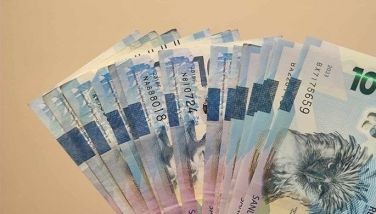RP says yuan revaluation to boost Asian currencies
July 23, 2005 | 12:00am
China’s revaluation of the yuan will cause a strengthening of Asian currencies but those that appreciate less will become more competitive, the Bangko Sentral ng Pilipinas said yesterday.
BSP Governor Amando Tetangco Jr. said in a statement that China’s move was "widely anticipated... (and was) expected to result in the strengthening of Asian currencies but in varying degrees."
"Those that appreciate less will gain competitiveness," he said. He did not give any forecast on how the Philippine peso would perform.
The peso, which closed at 55.77 to the dollar last Thursday, opened at 55.25 yesterday after China’s action was announced. An hour after trading opened, it was at 55.429 to the dollar and eventually closed at 55.89 to the dollar or 12 centavos lower than Thursday’s close.
However, Jonathan Ravelas of Banco de Oro Universal Bank warned that the local currency could still be affected by local political and security concerns ahead of expected huge protests on July 25 calling for the ouster of President Arroyo.
SINGAPORE – Asia woke to a changed financial landscape yesterday after China finally abandoned its decade-old peg to the dollar, with regional governments and analysts widely applauding Beijing for the move.
Asian currencies were uniformly tipped to appreciate in the long-term following China’s announcement on Thursday to scrap the yuan peg for an undisclosed trade-weighted basket of currencies.
The region’s economic growth rates were also expected to get a boost, according to analysts who further predicted China’s move would inevitably be the start of a long process of the yuan regime becoming more flexible.
The most immediate impact came in Malaysia, which announced virtually straight after China on Thursday night it had scrapped the ringgit’s seven-year-old peg to the dollar in favor of a managed float.
"Do not underestimate the significance of a new currency policy for China," JPMorgan equities strategist Adrian Mowat said.
"An appreciating renminbi would accelerate the current trend of appreciating Asian currencies while boosting the region’s reflating economies.
"Strong currencies should attract capital and discourage the export of savings, adding to demand for Asian assets."
The yuan, or renminbi, was revalued at 8.11 to the US dollar compared to 8.28, effectively a two-percent revaluation.
It will be allowed to trade 0.3 percent either side of a daily fixed rate and trade in a managed float against a basket of trade-weighted currencies.
The move came after sustained pressure from the United States and other Western nations worried about China’s perceived trading advantage with an artificially weak currency unfairly boosting the nation’s exports.
While the West would have preferred the yuan’s trading band to have been much wider, DBS greater China analyst Chris Leung was among a chorus of economists predicting Beijing would eventually adopt greater forex flexibility.
"(China) will eventually have to allow bigger movement flexibility for the exchange rate to reflect changes in the underlying currency basket," Leung said.
"I believe the next step will be the adoption of a wider trading band."
Governments around the region generally welcomed China’s revaluation, although they emphasised a two-percent appreciation in itself would not have a major initial impact.
Singapore, which manages its dollar against a basket of currencies in a similar formula that China has now moved to, said Beijing’s move would "not have a major impact on the Singapore dollar or on our exchange rate regime.
"Our current exchange rate policy stance remains appropriate," the Monetary Authority of Singapore, the city-state’s central bank, said in a statement.
"The fundamentals of the economy have not changed, nor have the factors influencing the growth prospects for the Singapore economy."
However analysts said the Singapore dollar would be one of the currencies most affected by the twin moves of China and Malaysia, and would be expected to appreciate by at least two percent almost immediately.
BSP Governor Amando Tetangco Jr. said in a statement that China’s move was "widely anticipated... (and was) expected to result in the strengthening of Asian currencies but in varying degrees."
"Those that appreciate less will gain competitiveness," he said. He did not give any forecast on how the Philippine peso would perform.
The peso, which closed at 55.77 to the dollar last Thursday, opened at 55.25 yesterday after China’s action was announced. An hour after trading opened, it was at 55.429 to the dollar and eventually closed at 55.89 to the dollar or 12 centavos lower than Thursday’s close.
However, Jonathan Ravelas of Banco de Oro Universal Bank warned that the local currency could still be affected by local political and security concerns ahead of expected huge protests on July 25 calling for the ouster of President Arroyo.
Asian currencies were uniformly tipped to appreciate in the long-term following China’s announcement on Thursday to scrap the yuan peg for an undisclosed trade-weighted basket of currencies.
The region’s economic growth rates were also expected to get a boost, according to analysts who further predicted China’s move would inevitably be the start of a long process of the yuan regime becoming more flexible.
The most immediate impact came in Malaysia, which announced virtually straight after China on Thursday night it had scrapped the ringgit’s seven-year-old peg to the dollar in favor of a managed float.
"Do not underestimate the significance of a new currency policy for China," JPMorgan equities strategist Adrian Mowat said.
"An appreciating renminbi would accelerate the current trend of appreciating Asian currencies while boosting the region’s reflating economies.
"Strong currencies should attract capital and discourage the export of savings, adding to demand for Asian assets."
The yuan, or renminbi, was revalued at 8.11 to the US dollar compared to 8.28, effectively a two-percent revaluation.
It will be allowed to trade 0.3 percent either side of a daily fixed rate and trade in a managed float against a basket of trade-weighted currencies.
The move came after sustained pressure from the United States and other Western nations worried about China’s perceived trading advantage with an artificially weak currency unfairly boosting the nation’s exports.
While the West would have preferred the yuan’s trading band to have been much wider, DBS greater China analyst Chris Leung was among a chorus of economists predicting Beijing would eventually adopt greater forex flexibility.
"(China) will eventually have to allow bigger movement flexibility for the exchange rate to reflect changes in the underlying currency basket," Leung said.
"I believe the next step will be the adoption of a wider trading band."
Governments around the region generally welcomed China’s revaluation, although they emphasised a two-percent appreciation in itself would not have a major initial impact.
Singapore, which manages its dollar against a basket of currencies in a similar formula that China has now moved to, said Beijing’s move would "not have a major impact on the Singapore dollar or on our exchange rate regime.
"Our current exchange rate policy stance remains appropriate," the Monetary Authority of Singapore, the city-state’s central bank, said in a statement.
"The fundamentals of the economy have not changed, nor have the factors influencing the growth prospects for the Singapore economy."
However analysts said the Singapore dollar would be one of the currencies most affected by the twin moves of China and Malaysia, and would be expected to appreciate by at least two percent almost immediately.
BrandSpace Articles
<
>
- Latest
- Trending
Trending
Latest























